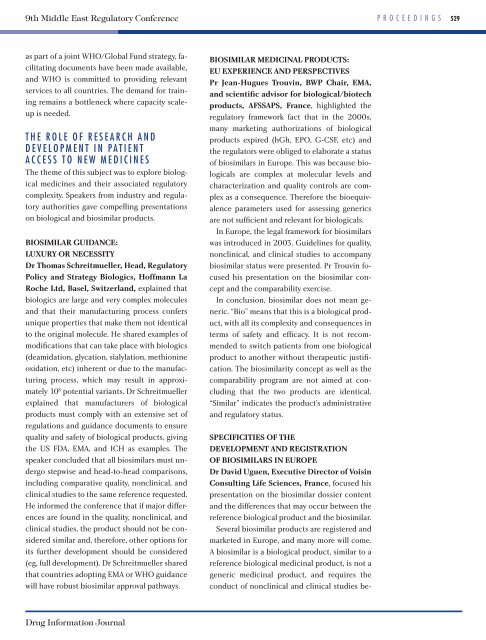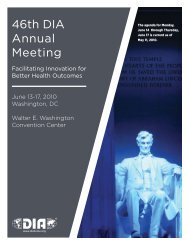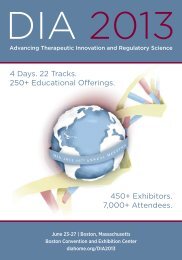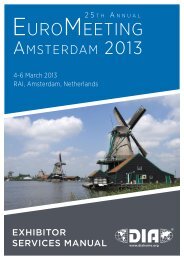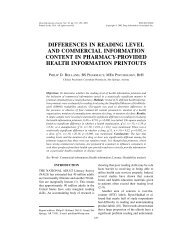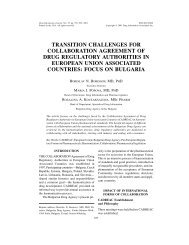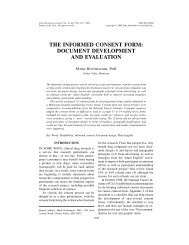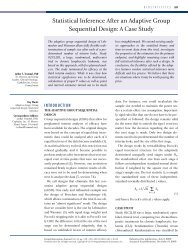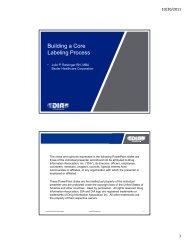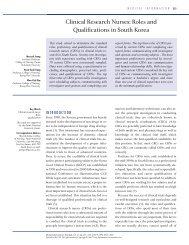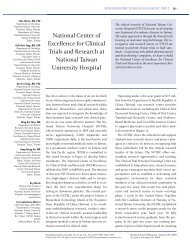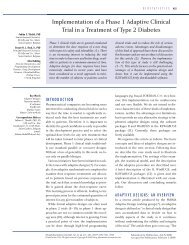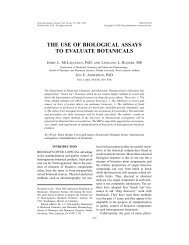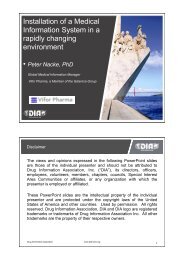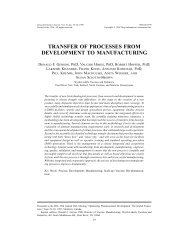Review of the 9th Middle East Regulatory Conference - Drug ...
Review of the 9th Middle East Regulatory Conference - Drug ...
Review of the 9th Middle East Regulatory Conference - Drug ...
Create successful ePaper yourself
Turn your PDF publications into a flip-book with our unique Google optimized e-Paper software.
<strong>9th</strong> <strong>Middle</strong> <strong>East</strong> <strong>Regulatory</strong> <strong>Conference</strong> p r o c e e d i n g s 529<br />
as part <strong>of</strong> a joint WHO/Global Fund strategy, facilitating<br />
documents have been made available,<br />
and WHO is committed to providing relevant<br />
services to all countries. The demand for training<br />
remains a bottleneck where capacity scaleup<br />
is needed.<br />
t h e r o L e o f r e s e a r c h a n d<br />
d e V e L o p m e n t i n pat i e n t<br />
a c c e s s t o n e w m e d i c i n e s<br />
The <strong>the</strong>me <strong>of</strong> this subject was to explore biological<br />
medicines and <strong>the</strong>ir associated regulatory<br />
complexity. Speakers from industry and regulatory<br />
authorities gave compelling presentations<br />
on biological and biosimilar products.<br />
biosimiLar guidanCE:<br />
Luxury or nECEssity<br />
dr thomas schreitmueller, head, regulatory<br />
Policy and strategy biologics, h<strong>of</strong>fmann La<br />
roche Ltd, basel, switzerland, explained that<br />
biologics are large and very complex molecules<br />
and that <strong>the</strong>ir manufacturing process confers<br />
unique properties that make <strong>the</strong>m not identical<br />
to <strong>the</strong> original molecule. He shared examples <strong>of</strong><br />
modifications that can take place with biologics<br />
(deamidation, glycation, sialylation, methionine<br />
oxidation, etc) inherent or due to <strong>the</strong> manufacturing<br />
process, which may result in approximately<br />
10 8 potential variants. Dr Schreitmueller<br />
explained that manufacturers <strong>of</strong> biological<br />
products must comply with an extensive set <strong>of</strong><br />
regulations and guidance documents to ensure<br />
quality and safety <strong>of</strong> biological products, giving<br />
<strong>the</strong> US FDA, EMA, and ICH as examples. The<br />
speaker concluded that all biosimilars must undergo<br />
stepwise and headtohead comparisons,<br />
including comparative quality, nonclinical, and<br />
clinical studies to <strong>the</strong> same reference requested.<br />
He informed <strong>the</strong> conference that if major differences<br />
are found in <strong>the</strong> quality, nonclinical, and<br />
clinical studies, <strong>the</strong> product should not be considered<br />
similar and, <strong>the</strong>refore, o<strong>the</strong>r options for<br />
its fur<strong>the</strong>r development should be considered<br />
(eg, full development). Dr Schreit mueller shared<br />
that countries adopting EMA or WHO guidance<br />
will have robust biosimilar approval pathways.<br />
<strong>Drug</strong> Information Journal<br />
biosimiLar mEdiCinaL ProduCts:<br />
Eu ExPEriEnCE and PErsPECtivEs<br />
Pr Jean-hugues trouvin, bwP Chair, Ema,<br />
and scientific advisor for biological/biotech<br />
products, aFssaPs, France, highlighted <strong>the</strong><br />
regulatory framework fact that in <strong>the</strong> 2000s,<br />
many marketing authorizations <strong>of</strong> biological<br />
products expired (hGh, EPO, GCSF, etc) and<br />
<strong>the</strong> regulators were obliged to elaborate a status<br />
<strong>of</strong> biosimilars in Europe. This was because biologicals<br />
are complex at molecular levels and<br />
characterization and quality controls are complex<br />
as a consequence. Therefore <strong>the</strong> bioequivalence<br />
parameters used for assessing generics<br />
are not sufficient and relevant for biologicals.<br />
In Europe, <strong>the</strong> legal framework for biosimilars<br />
was introduced in 2003. Guidelines for quality,<br />
nonclinical, and clinical studies to accompany<br />
biosimilar status were presented. Pr Trouvin focused<br />
his presentation on <strong>the</strong> biosimilar concept<br />
and <strong>the</strong> comparability exercise.<br />
In conclusion, biosimilar does not mean generic.<br />
“Bio” means that this is a biological product,<br />
with all its complexity and consequences in<br />
terms <strong>of</strong> safety and efficacy. It is not recommended<br />
to switch patients from one biological<br />
product to ano<strong>the</strong>r without <strong>the</strong>rapeutic justification.<br />
The biosimilarity concept as well as <strong>the</strong><br />
comparability program are not aimed at concluding<br />
that <strong>the</strong> two products are identical.<br />
“Similar” indicates <strong>the</strong> product’s administrative<br />
and regulatory status.<br />
sPECiFiCitiEs oF thE<br />
dEvELoPmEnt and rEgistration<br />
oF biosimiLars in EuroPE<br />
dr david uguen, Executive director <strong>of</strong> voisin<br />
Consulting Life sciences, France, focused his<br />
presentation on <strong>the</strong> biosimilar dossier content<br />
and <strong>the</strong> differences that may occur between <strong>the</strong><br />
reference biological product and <strong>the</strong> biosimilar.<br />
Several biosimilar products are registered and<br />
marketed in Europe, and many more will come.<br />
A biosimilar is a biological product, similar to a<br />
reference biological medicinal product, is not a<br />
generic medicinal product, and requires <strong>the</strong><br />
conduct <strong>of</strong> nonclinical and clinical studies be


